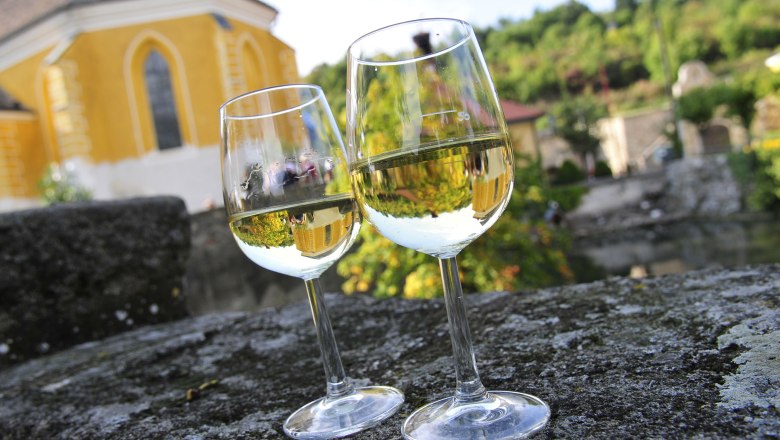Exquisite wine dictionary
Let us assist you with your first order at the wine tavern.
“Heuriger”:
In Lower Austria the word Heuriger describes young wine as well as the tavern where the wine is served from home production. One could be talking about a Buschenschank (typical tavern), a limited season of serving at the grower’s premises or a catering business run as a Heuriger.
Wine cellar lane:
Usually a very romantic, millennia-old collection of lanes with cellars at the edge of a wine village. This is where one used to (and often still does) press, taste, store and sell the wine - and celebrate it.
“Ausg’steckt”:
According to Lower Austrian tavern law the “owners of vineyards and orchards reserve the right to serve wine from their own production for a fee” and this right is much exercised and with pleasure. So when a tavern or Heuriger is “ausg’steckt” then it means it has opened up for the season. This is signalled by a “bush” made out of several branches, lit up in colour in order to be recognised better, and hung up in the porch to be seen from a far.
Alcohol at the wheel:
In general the law allows a maximum alcohol level of less than 0.5 in the blood.
Achterl:
The basic unit of Austrian serving for quality wine is the “Achterl” (an eighth) and logically describes an eighth of a litre of wine. This has been common even in the wine taverns for a few years, which were seeing the “Viertel” (= a quarter, quarter of a litre) as the ideal wine serving for a long time and put the quality of wine before the quantity. The Achterl appears in various forms, for example the Speedy Achterl, when you allowed yourself another glass before departing, or the Stand-up Achterl, which was sipped occasionally whilst standing, and usually combined with a little snack.
G’spritzter:
Mixing wine with water is not taken lightly in Austria. Indeed, defined by wine law, the mix is at least one part dry wine with one part soda or mineral water and at least a 4.5% volume of alcohol.
Cider:
In general Lower Austrian language, cider describes a slightly alcoholic, gently sour and stimulating drink made from apples and pears (above all in the cider district of Western Lower Austria and in the Buckligen Welt in the south). Grape cider is made from the juice of grapes before fermentation starts and can be bought as such.
Sturm:
It is obvious that Sturm is available only in autumn. It depicts the cloudy grape cider once fermentation begins; and the cider is of course only available in the weeks following the harvest. One should enjoy the Sturm in moderation, not only because of its alcohol content but also because of its stimulating effect on the metabolism.
Pfefferl:
The most well-known characteristic of the Grüne Veltliner, the Lower Austrian parade grape variety, is the soft and gentle scent and flavour reminding of pepper. And since it’s only a gentle reminder, we don’t say pepper, but rather use the loving diminutive “Pfefferl”.
Summer wine/Terrace wine:
On hot summer days or carefree (BBQ) evenings on the terrace, highly complex, very alcoholic, ambitious wines are not suitable as refreshment - a total contrast to the light, uncomplicated, fruity wines, which are therefore called summer wines or terrace wines, and not in a derogatory tone.
DAC:
This is an abbreviation of Districtus Austriae Controllatus: Based on the current Austrian quality wine system DAC wines are those which above all have a distinctive flavour typical of a native wine growing region.
Federspiel:
The Wachau wine growing association Vinea Wachau Nobilis Districtus sorts its dry white wines into three categories: “Steinfeder” refers to all wines with up to 11.5% vol., “Federspiel” to those with up to 12.5% vol. - with at least 17° KMW (sugar measuring unit for wine), and “Smaragd” to those with a higher alcohol content. The term “Federspiel” originates from falconry which was a great tradition in Wachau: This means simulating prey in order to lure a falcon back to your hand.
Good health – may you live long!
A few rituals and particularities have developed around cider. The Mostviertel etiquette, for example, stipulates that you don’t say cheers, but rather “G’sundheit” (“Good health!”). The right reply to that is “Sollst leben!” (“May you live long!”)
